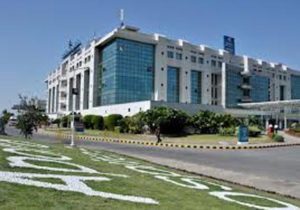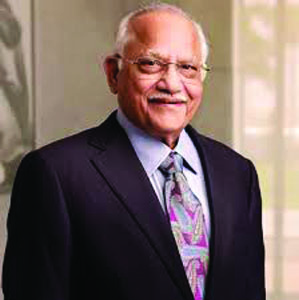NE HEALTH BUREAU
AHMEDABAD, MARCH 26
Healthcare major Apollo Hospitals on Thursday announced the launch of ‘Project Kavach’ to fight the spread of Covid-19. Translated as ‘project shield’, the plan encompasses information sharing, screening and assessment, testing and readying the infrastructure for quarantine and treatment.
The announcement was made at a virtual media conference held online with the top management from Chennai and Hyderabad addressing the press across the country.
The healthcare major is setting aside 250 beds out of its total network of around 8,000 beds though the founder and chairman Dr Prathap C Reddy feels the country will need to have at least 50,000 beds and dedicated facilities because of the highly infectious nature of the virus.
“We are telling the government that they need to set aside 500-bed hospitals which we will help manage. We are already doing that in Nellore in Andhra and in Bhubaneswar, where we have also taken up management of a certain number of beds within large government hospitals,” says Sangita Reddy, his youngest daughter, and the Joint Managing Director, Apollo Hospitals.
Detailing the response plan that included hospital beds allotted, testing of patients, stocking of its pharmacy chain, setting up fever clinics and isolation centres, Preetha Reddy, Vice Chairperson, Apollo Hospitals Group and the eldest daughter of the founder, said, “While we hope that community transmission does not take place on a large scale, we need to be prepared for the eventuality. This stage will see a constant requirement of highly specialised treatment for the critically ill. Apollo Hospitals with its network of 70 hospitals also has the largest number of isolation and ICU facilities in the private sector. There will be over 250 beds which can be enhanced to 500 beds, created only to treat the critically ill at any given time. We expect to give advanced care to over 2,000 patients a month.”

The company says it has 1,000 ventilators that could be put into service as and when required. Also, the group will be launching isolation facilities near its hospitals from March 28.
Apollo Hospitals has been training its health personnel on the latest treatment protocols. Adequate personnel has been pressed into service with provision for quarantine quarters to house them separately. Meanwhile, medicines, consumables, hospital supplies, negative pressure rooms, ventilators, and additional medical equipment have been procured or reserved with vendors to meet any increase in demand. “We have also ensured stocking of PPE (Personal Protection Equipment) for all our staff,” says Preetha Reddy.
Dr Prathap C. Reddy said, “We are closely following the Singapore model where not a single healthcare worker died. We reiterate the importance of governments creating large separate hospitals for handling Covid-19. We believe that the lockdown is going to help significantly in flattening the curve but we feel that we still need to have at least 50,000 beds across the country in dedicated facilities because of the highly infectious nature of the virus. We are already working in Bhubaneswar and Andhra Pradesh and have committed our assistance in managing certain beds. We have set up a protocol for managing EICU that are manned by our specialist, expert pulmonologists and intensivists 24/7.”
Besides, 17 fever clinics and sample collection centres, which will essentially be OP clinics that will look at the symptoms and not the final testing. The picture is still unclear on the pricing of the facilities (in the critical care or at the fever clinics) though for the testing there is a price cap of Rs 4,500.
Shobana Kamineni, Executive Vice Chairperson, Apollo Hospitals Group, who leads the pharmacy business at the group, said, “The 3,800 Apollo pharmacies across 18 states will be pressed into action with all the medication, consumables and supplements. Stocks have been doubled, prices will be strictly monitored and controlled, and home delivery capability has been enhanced. It is estimated that the capacity can be ramped up from the 500,000 people served daily to 1 million if required.”
She also referred to “Apollo Hospitals designed AI-based Coronavirus Risk Assessment scan for screening and initial assessment, which is available in the form of an app and on the following website: https://covid.apollo247.com/. The Risk assessment scan, which is available in six regional languages, will guide individuals about the potential risk of having the virus through simple interactive questions. Based on the risk level, people are guided to contact the certified help center.”
Sangita Reddy talked about the testing and isolation facilities and said four molecular testing centres equipped with all the RNA isolation, RT-PCR equipment, and the kits are operational and there are 17 fever clinics and sample collection centres. “Most Apollo centers have been cleared for COVID-19 testing, the full infrastructure is expected to be in place and full-scale testing is to start by the end of March. There will be provision for home collection of samples as well as Drive Through Testing. In-hospital testing will be discouraged except for inpatients. Dedicated, fever clinics are being set up to screen people. People who qualify under the criteria for tests would enter via the drive-through, make the payment as per the government recommended charges and then be tested.”
She further said that the company will be launching “Project Stay I”, an innovative strategy to create medical rooms in hotels/hostels with light medical supervision for quarantine and creating a barrier before people come into the hospitals. “This would address the situation where over 50 per cent of the cases need only isolation and paracetamol. These medical rooms will be rolled out in Chennai, Mumbai, Hyderabad, Kolkata, Bangalore, and Delhi, starting with approximately 50 in each city, going up by 50 rooms every three days, to reach an eventual target of 5000 rooms across the country. These will be calibrated as per the need.” These would typically be near the Apollo hospitals.
With ‘Project Stay-I’ Apollo expects to help over 10,000-15,000 patients in a month and prevent over 50 lakh infections. “We are working with the government and will be able to share more details by Saturday as we launch the Stage 1 of ‘Project Stay -I,” says Sangita Reddy.









